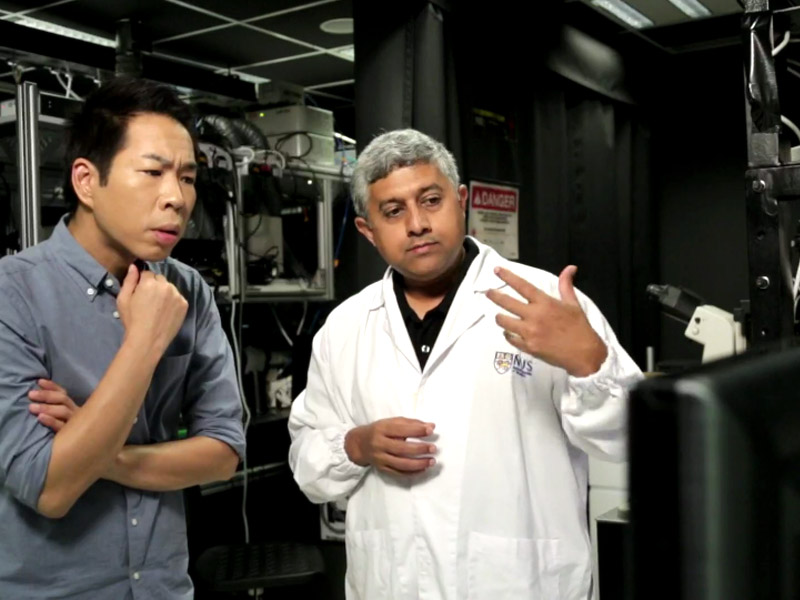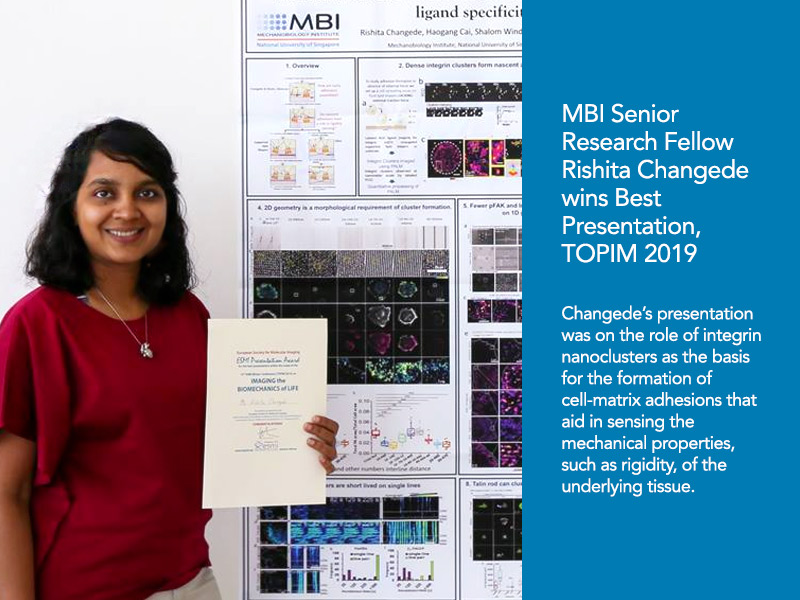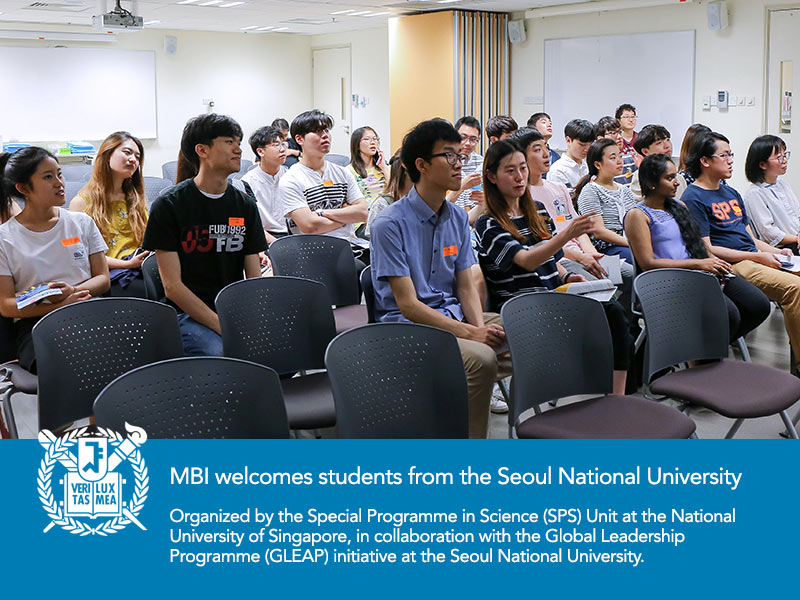2017 UNESCO Symposium – Cracking the Code: Girls Education in STEM
Lakshmi Ramachandran | September 2017
The UNESCO symposium (28-30 August, Bangkok, Thailand), ‘Cracking the Code: Girls Education in STEM’ focused on Education, in particular STEM (Science, Technology, Engineering and Mathematics), and Gender Equality, two of the Sustainable Development Goals (SDGs) outlined by the United Nations in its 2030 agenda. More information about the symposium.
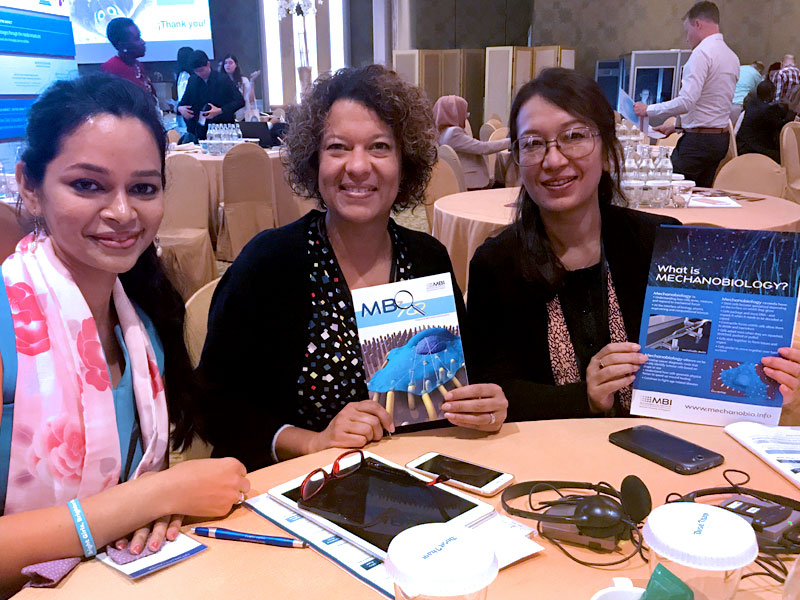
Participants of the symposium with Lakshmi Ramachandran (far left)
A Brief report on the UNESCO Girls Education in STEM Symposium
The UNESCO symposium (28-30 August, Bangkok, Thailand), ‘Cracking the Code: Girls Education in STEM’ focused on Education, in particular STEM (Science, Technology, Engineering and Mathematics), and Gender Equality, two of the Sustainable Development Goals (SDGs) outlined by the United Nations in its 2030 agenda.
The symposium commenced with opening remarks from the UNESCO Director-General, Ms. Irina Bokova, the Vice-Minister of Education, Thailand, Dr. Sophon Napathorn, and the Director, Division of Education for Inclusion, Peace and Sustainable development, UNESCO, Ms. Soo-Hyang Choi, who shared their vision to empower girls and women through STEM education and STEM careers.
As detailed in a global report on the topic launched at the meeting, females are highly underrepresented globally in STEM education (35%) and STEM research (28%). This report as well as the symposium brought out the complex issues underlying this problem such as societal stereotypes and biases, cultural barriers, lack of political will, lack of community engagement, gender stereotypes perpetuated through textbooks and the media, and last, but not the least, psychological factors that affect the performance and choices made by the individual.
Symposium Highlights: High level Policy Forum
A major highlight of the symposium was the high level policy forum in which ministers of education and senior government officials from various countries discussed and debated on the challenges, solutions and action steps. The high level policy forum was moderated by Ms. Zeinab Badawi, presenter of BBC’s Global Questions and Hard Talk, who shared her perspectives on the role media can play in impacting the society, and called for action in changing the way gender stereotypes are perpetuated through the media, especially in STEM fields. More information about the symposium.
The symposium explored multi-pronged approaches to tackle gender gaps in STEM education at the individual, family & peers, schools/educational institutions, society and government levels.
Over the course of the symposium, multiple sessions addressed these problems as well as possible practical solutions. It became apparent that a multi-pronged approach is needed to tackle the problems which permeate multiple layers of the society starting with the individual, family, peers and schools/educational institutions. The need for training teachers to build their capacities in order to positively impact girls’ education in STEM was highly emphasized.
Similarly the high potential of digital skills in empowering both girls and women were stressed in many talks. An interesting workshop by Labster showcased the potential of virtual reality as a gender change agent. Two highly impactful grassroots level initiatives which cater to the underprivileged, the Barefoot College and Indian Girls Code, portrayed a successful recipe of practicality, dedication, and compassion in empowering females through technology.
Bright Girls, Brighter Future
The critical role of public-private partnerships in improving girls’ education in STEM was also discussed in the symposium. For instance, the UNESCO-CJ Group partnership, which launched the ‘Bright Girls, Brighter Future’ global education campaign contributes towards this cause through digital (Rainbow Ruby animated television series) and cultural platforms (e.g. concerts) in addition to funding projects on girls’ education. On a similar note the L’Oréal-UNESCO ‘For women in science’ programme recognizes and supports stellar women researchers. The lively presentation on adorable and gutsy Sesame Street female Muppets showed how TV series with a mass appeal for kids can help break gender stereotypes.
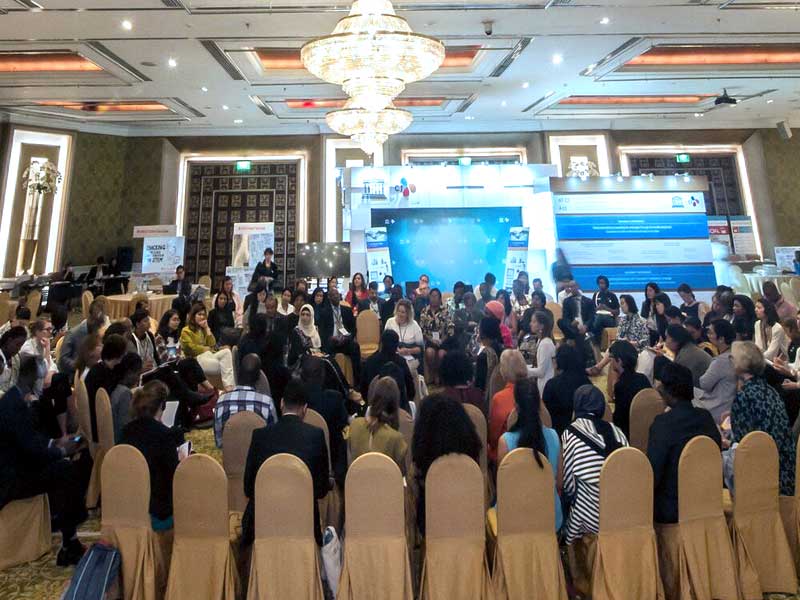
The ‘Fishbowl Exercise’ at the UNESCO Cracking the Code- Girls education in STEM. The format of this session allowed anyone from the sudience to share their ideas towards reaching out, engaging and empowering girls in STEM. Dr.Lakshmi Ramachandran, Science Writer at the Mechanobiology Institute (MBI), National University of Singapore, shared the effectiveness of Mechanobiology Institute (MBI) outreach programs in stimulating interest in research by providing students with early exposure to research environments.
Though the major focus of the symposium was on engaging more girls in STEM education, there was also considerable focus on women’s careers in STEM. It is important to address the ‘leaky career pipe’ where women drop out of STEM careers post PhD or a postdoctoral fellowship leading to significantly less representation of women in senior leadership roles as compared to men. This not only leads to loss of talented and skilled individuals but also influences the choices girls make while choosing their careers. In this regard, the UNESCO Stem and Gender Advancement (SAGA) programme assists policy-makers in assessing gender gaps in STEM education and careers, as well as in setting up, implementing, monitoring and evaluating appropriate science, technology and innovation (STI) policies to bridge the gender gaps.
The extremely informative and insightful symposium concluded with reflections on the symposium and the various outcomes, which included novel ideas, projects and collaborations towards making a positive difference towards girls’ education in STEM.
Find out more
- www.barefootcollege.org
- www.robotixedu.com/indiangirlscode.aspx
- en.unesco.org/themes/education-and-gender-equality/cj-partnership
- www.forwomeninscience.com/en/homehttp://www.unesco.org/new/en/natural-sciences/priority-areas/gender-and-science/improving-measurement-of-gender-equality-in-stem/stem-and-gender-advancement-saga/




